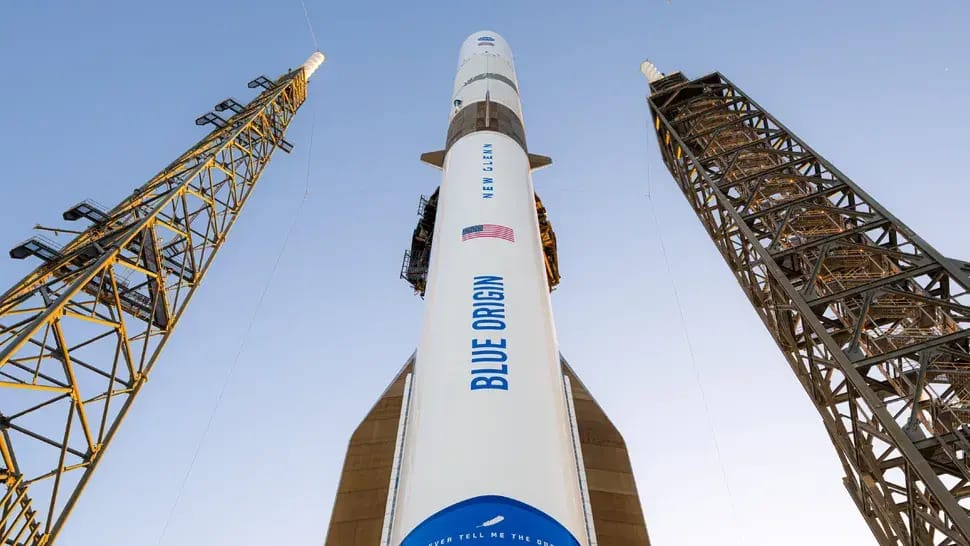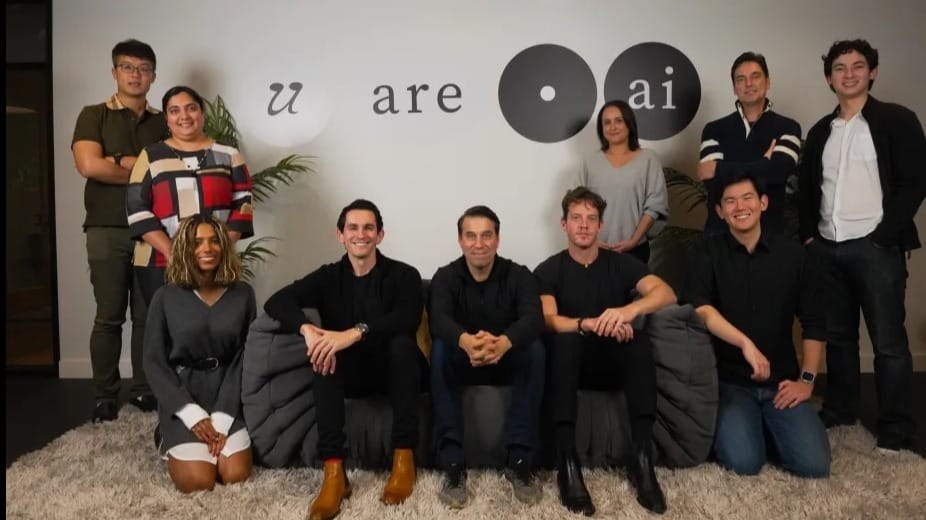- The Rundown Tech
- Posts
- Blue Origin nails SpaceX signature move
Blue Origin nails SpaceX signature move
PLUS: Thinking Machines Lab targets $50B valuation
Good morning, tech enthusiasts. Blue Origin just pulled off a major win: bringing its behemoth New Glenn booster back from the edge of space in one piece.
The company’s long-delayed rocket finally stuck a sea landing — and set NASA’s twin Mars probes on their way. After years of trailing SpaceX, is this the moment Jeff Bezos’ space ambitions really take off?
Reminder: Our next workshop, ‘AI Essentials for Leaders & Managers,’ is today at 4 PM EST. Join and learn how to assess organizational AI readiness, choose which AI projects get the green light, and more. RSVP here.
In today’s tech rundown:
Blue Origin lands booster and hits major milestone
Thinking Machines Lab eyes $50B valuation
Privacy-first smart glasses challenge Meta Ray-Bans
Immortality startup pivots to AI-clone assistants
Quick hits on other tech news
LATEST DEVELOPMENTS
BLUE ORIGIN

Image source: Blue Origin
The Rundown: Space company Blue Origin’s massive New Glenn rocket nailed its first booster recovery at sea during its second flight, delivering NASA’s twin Mars probes to orbit and proving Jeff Bezos can finally play in SpaceX’s reusable rocket league.
The details:
The rocket lifted off from Cape Canaveral Space Force Station, carrying twin Mars-bound satellites on their months-long journey.
The successful booster recovery marks a major turnaround from New Glenn’s debut flight, where the rocket reached orbit but failed to recover its first stage.
Blue Origin has struggled for years to translate Bezos’ deep pockets into orbital success, lagging far behind SpaceX in launch cadence and technology.
SpaceX has conducted over 130 Falcon 9 launches in 2024 alone, with a 99% success rate, setting a punishing bar for Blue Origin.
Why it matters: Like SpaceX’s industry-dominant Falcon 9, New Glenn is engineered for partial reusability — a strategy designed to slash launch costs and challenge SpaceX’s grip on commercial launches. This successful recovery proves New Glenn can deliver on its reusability promises, potentially opening the door to lucrative contracts.
THINKING MACHINES LAB

Image source: YouTube / Atomico
The Rundown: Thinking Machines Lab, founded by former OpenAI CTO Mira Murati, is negotiating a new round at a roughly $50B valuation, with whispers stretching it to $60B depending on investor appetite, reports Bloomberg.
The details:
The funding would more than quadruple TML’s July mark, when the year‑old startup closed a staggering $2B seed at a $12B valuation.
Murati left OpenAI in September 2024 after serving as CTO during the company’s ChatGPT explosion, giving her unmatched credibility with investors.
A month ago, Thinking Machines unveiled Tinker, a Python-based API for LLM fine-tuning that gives researchers low-level control over training workflows.
Why it matters: Thinking Machines Lab has vaulted from $12B to talk of $50B in under four months, with Tinker still sealed in private beta. If the round hits that mark, it suggests elite AI pedigrees can now summon blockbuster valuations on momentum alone. Not bad for a one-year-old lab muscling into the top tier of private AI startups.
EVEN REALITIES

Image source: Even Realities
The Rundown: Even Realities just unveiled the G2 Display smart glasses, a camera-free, speaker-less pair pitched as “human-centric” wearables that won’t freak out bystanders or leak your audio into the world. Plus, they come with a smart ring.
The details:
The upgraded G2 Display smart glasses, priced at $599, feature the startup’s HAO engine — micro-LED projectors, waveguides, and digitally surfaced lenses.
Frames hit 36 grams in magnesium and titanium (down from 44g), with an IP67 rating, adjustable nose pads, prescription support, and clip-on sunglasses.
Battery runs two-plus days per charge, while four mics power Conversate AI for real-time translation across 31 languages, teleprompter mode, and navigation.
The optional $249 R1 smart ring adds gesture controls and health tracking (heart rate, temp, steps, calories) with a four-day battery.
Why it matters: Shipping smart glasses with only a microphone might seem quaint in an era where every gadget demands AI and camera integration, but Even Realities is betting users will trade features for peace of mind — and the ability to wear them without triggering Meta Ray-Ban levels of privacy anxiety.
UARE.AI

Image source: Urae.ai
The Rundown: Immortality startup Eternos just shifted gears with a new name — Uare.ai, pivoting from “digital afterlife” memorials to building AI clones of living people that can speak in your voice and handle real work in real time.
The details:
The shift follows early user demand for immediate utility over posthumous sentimentality, and comes alongside a $10.3M seed round.
Eternos launched in 2024 to let people record life stories and voices for loved ones after death — a niche product that struggled to find traction.
Uare.ai now aims to build an “AI twin” that mirrors your values, judgment, and tone to handle routine tasks, answer questions, and manage email and Slack.
The company drew attention when terminally ill client Michael Bommer spent 25 hours recording to create a talkative digital replica for his family.
Why it matters: The shift from digital memorials to full-blown productivity reveals what people might want: not digital ghosts, but personal assistants that sound exactly like them and handle the tedious parts of being online. If Uare.ai can pull that off without triggering identity fraud cases, it could redefine how we delegate our digital selves.
QUICK HITS
Google, facing a near €3B EU antitrust penalty, offered to tweak its ad tech products even as it appeals the ruling.
Apple launched a $230 knitted iPhone strap designed with Issey Miyake, essentially a designer sock for your phone that the company is calling an “additional pocket.”
Tesla may add Apple CarPlay as soon as late this year in a sharp pivot for the EV giant after years of shunning third‑party infotainment in favor of its homegrown system.
Verizon is reportedly preparing to cut up to 20K jobs and convert roughly 180–200 stores into franchises, marking one of the largest workforce reductions in its history.
Amazon is tightening its Fire TV ecosystem, blocking apps linked to piracy on both new and existing devices to curb illegal streaming.
Starlink rival Project Kuiper is now dubbed Amazon Leo, giving Amazon’s seven-year satellite internet effort an official name.
Airbnb will pilot in‑app Instacart grocery ordering starting in January, letting guests stock kitchens before or during stays while select hosts handle delivery and put‑away.
Divine, a Jack Dorsey–backed app, launched to revive Vine’s six‑second loops, opening access to 100K+ archived clips from pre‑shutdown backups to fight AI slop.
Apple updated its App Review Guidelines to require apps to clearly disclose and obtain explicit user consent before sharing personal data with third‑party AI services.
Uber is quietly testing in‑app video recording for drivers in India to curb rider misconduct and protect against false complaints in a market where dashcams are rare.
COMMUNITY
Read our last AI newsletter: AI’s autonomous attack era begins
Read our last Tech newsletter: Musk wins $1T pay package
Read our last Robotics newsletter: 'Putin lookalike' robot face-plants
Today’s AI tool guide: Use Codex to write code on the web with AI agents
RSVP to workshop @ 4PM EST today: AI Essentials for Leaders & Managers
That's it for today's tech rundown!We'd love to hear your feedback on today's newsletter so we can continue to improve The Rundown experience for you. |
See you soon,
Rowan, Jennifer, and Joey—The Rundown’s editorial team

Reply